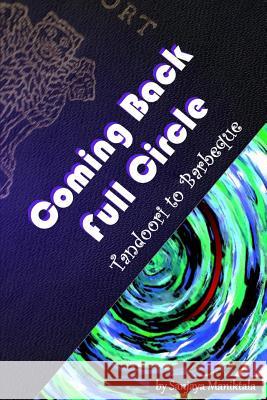Coming Back Full Circle: Tandoori to Barbeque » książka
Coming Back Full Circle: Tandoori to Barbeque
ISBN-13: 9781490985466 / Angielski / Miękka / 2013 / 364 str.
Sanjaya Maniktala, author of several well-known technical books, has written this genre-defying, tongue-in-cheek novel. Ken Coffman, accomplished author of eight books says: "It's a kaleidoscopic collage of snapshot memories, and like all good books, leaves us breathlessly wanting more. The playful language and multicultural commentary is simply delightful."
This "quirky memoir," as Coffman aptly calls it, is sadly bereft of any heart-rending stories about rummaging through empty dumpsters. There is nothing singularly uplifting on any single page. But it was never intended to get you to cry your heart out. It was only meant to make you smile from ear to ear. To be incredibly interesting.
There are fascinating multicultural quirks in abundance here, spanning decades spent criss-crossing through several cities in India, Germany, Singapore and the US. Plus life at two of India's most prestigious colleges, IIT Bombay and St. Stephen's College, Delhi. Feel the intensity and diversity of a completely different world out there.
Intertwined with the author's personal story is also the unforgettable tale of a well-known secessionist movement of India. At least two high-profile assassinations took place as a result, including that of the former Prime Minister of India, Mrs. Indira Gandhi. The parallel historical track of this memoir includes some details of that era, which perhaps, only the author was in a position to hear about and relate for the very first time here. You are warned: there are some grim moments as a result.
Here is a sample:
An official witness to the legal ceremony was a perpetually plastered lawyer named Mr. Bhinde. I had met him a few days ago when I had gone to the court to enquire about the general procedure, and it was now obvious to me, that he had not been dry for a minute ever since. But I also realized that good things come in pairs. Pretty soon, Mr. Bhinde had brought in another equally inebriated friend of his from somewhere out there - to complete the remaining drunken witness signature line on the imposing paperwork. Much to our good fortune, the magistrate seemed sober enough, and declared us man and wife shortly thereafter. I could have sworn he didn't stutter even once.
As we were trying to make our way out, I spotted Mr. Bhinde still lurching around helpfully in the crowds milling around the main courtroom. I came up from behind him, and after a little trial and error, managed to place a hand on his wavering shoulder. I handed him a box of Indian candy (gulab jamun) to mark the auspicious occasion. For a minute he turned around looking somewhat puzzled, as if we should have known all along that he would have preferred a bottle of Old Monk rum instead. But then he smiled. It was clear Mr. Bhinde's heart, if not his liver, was still in the pink of health. Touched by our sweet gesture, he started looking beseechingly at us as if we were the last people in the big wide world who still cared about him. And perhaps we were Then he burst into tears. Soon he was sitting there sobbing uncontrollably on the stairs of the majestic building, large tear drops streaming down his scrawny face, as a small crowd gathered around to watch with growing amusement. He proceeded to relate the story of his entire wretched life, starting from that dull rainy day when he was born to destitute parents under a nameless bridge somewhere deep within the squalor of Calcutta. He cried his heart out that ever since, he had consistently "failed to live up to his mama's expectations" (Looks like I wasn't the only one haunted by such dark remorseful thoughts). He expressed eternal sadness that he had turned out to be such an "utter failure of a son." He cried out: "Think what hopes dearest Mum must have had from her one and only child, but look at what he has turned out to be. He couldn't even gift her a nice devout daughter-in-law, to take care of her in her old age."
Zawartość książki może nie spełniać oczekiwań – reklamacje nie obejmują treści, która mogła nie być redakcyjnie ani merytorycznie opracowana.











